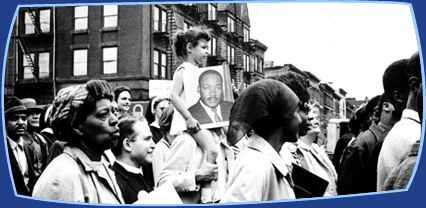

Poor People's Campaign March, New York City - Schomberg Center for Black Research, New York Public Library
The 1960s was a decade of rapid change and unrest in American life. The Vietnam War tore the country apart and racial tension increased as African Americans began to conduct non-violent protests against segregation. In 1963, Martin Luther King made his famous "I Have a Dream" speech to encourage equality for people of all races. His enthusiasm and hope for full equality sparked non-violent protests throughout the country. These protests were designed to call attention to the unequal treatment of African Americans and eventually became known as the civil rights movement.
Throughout the 1960s, civil rights activists were murdered and protesters were beaten and killed. The violent resistance to the civil rights movement fueled a sense of frustration and despair among many Americans.
The civil rights movement also had an impact on jazz. African American jazz artists had long resented the white owned record companies and clubs that controlled their income and to some degree their art. Some artists wanted to break away from these establishments and control their own music. At the same time many artists expressed their anger and disappointment at the slow pace of change in their music.

|






